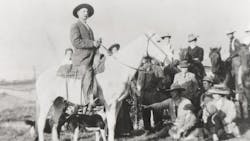For National Hispanic Month, we are recognizing deputized citizen Juan Castro of Oceanside, California, who paid the ultimate sacrifice. Occasionally throughout history civilians have been called upon to assist law enforcement. It was a practice that began in ninth century England. Posse comitatus, a Latin term for “power of the county,” commonly referred to a body of men, typically armed, which were summoned by a sheriff to enforce the law. Prior to the American Revolution, the posse in America was transformed from an instrument of royal power to an institution of self-governance. Then came the Fugitive Slave Act of 1850 which forced residents to assist federal authorities in pursuing fugitive slaves. After 1878, posse comitatus returned to its traditional role as a power of the sheriff.
Posses became widely used during the Wild West era to answer for a lack of law enforcement on the frontier. As law enforcement became more professionalized, it would appear that the need for ordinary citizens to combat crime was no longer needed. However, the use of posse comitatus is still very much alive. They were used to go after serial killer Ted Bundy in 1977. Hinsdale County, Colorado, is considered to be one of the most remote counties in the lower 48 states.
In 1994, two bank robbers killed the sheriff, leaving the undersheriff as the only law enforcement officer in the county. He deputized a hundred citizens to help find the killers. In 2020, the Sheriff of Pinal County, Arizona, created a “citizens posse” to assist in law enforcement situations. While many sheriffs are embracing posse comitatus, other states are abandoning it. In 2019, California repealed the Posse Comitatus Law of 1872 that made it a misdemeanor to refuse to assist law enforcement when requested which included pursuing escaped prisoners and breaches of the peace.
In September 1895, Oceanside Constable Ben Hubbert organized a posse to pursue career criminal Isadore Rentarias. A native of Hermosillo, Mexico, Rentarias came to California where he was sentenced in 1862 for 10 years for horse theft in Constable Ben Hubbert Oceanside Historical Society Contra Costa County. After escaping en route to the prison, he fled to Los Angeles. After shooting someone while at the San Gabriel Mission, he fled once again, arriving in San Diego where he ran a saloon for a short time. On the evening of September 6th near San Luis Rey, a township four miles east of Oceanside, Rentarias shot Ramon Araiza. Rentarias was beating and choking his wife while he was also pulling her along the ground by her hair. Araiza went to her rescue and was shot.
As soon as Rentarias fled, Constable Ben Hubbert organized a posse to prevent his escape into Mexico. The posse consisted of the Burlock brothers, Edward Goodin and Juan Castro, who was the cousin of Araiza. Castro brought law enforcement experience to the group as he was previously an officer in Mexico City. Rentarias headed to Palomar Mountain, which was one of the most inaccessible areas in San Diego County. He eventually arrived in Mesa Grande (about 50 miles from Oceanside), which was heavily populated with Native Americans.
The pursuit lasted nearly 10 days. At times, the posse came close to capturing Rentarias, with gunshots being exchanged. Rentarias had help from the Native Americans who provided him food and gave him intelligence on the location of the posse. These same Native Americans would also help lead the posse to Rentarias’ last known location.
During the day, Rentarias would take up position in the brush so that he could pick off anyone that came close to him. He would travel at night since he was familiar with the area. He was ambushed on numerous occasions but was able to escape. On Sunday morning, Sept. 15, Rentarias killed a horse ridden by one of the posse members. The posse retreated to attack again at noon.
More local residents had joined the posse and taken up armed positions. During the retreat, Rentarias moved closer to the posse so that he would have more of an advantageous ambush position. He had taken up position behind a large boulder. Hubbert and Castro proceeded cautiously up the mountainside. Castro heard what seemed to be a cough coming from near the boulder. They both proceeded in that direction. Green foliage partly concealed the boulder and in an instant, a shot rang out. Castro was shot and killed. Constable Hubbert returned fire, killing Renterias.
The nearest telegraph station was 30 miles away so it would be the next morning before the deaths were made public. Castro’s body was brought back to San Luis Rey by train. His funeral was attended by almost everybody in the surrounding county. He was held in such high esteem and he was known for his bravery and courage. He left behind a wife.
During the inquest, Constable Hubbert was exonerated for the death of Renterias. A discovery was made during the inquest that Hubbert’s bullet did not kill Renterias. Castro’s weapon contained an empty shell. With this information they were able to determine that Castro was shooting at a downward angle and across his left side. Based on the position of the two men, both shots were fired simultaneously.
Hubbert was supposed to receive an award of $120 for the slaying of Renterias with the intention of turning it over to Castro’s widow. The local newspaper, The Oceanside Blade, suggested that Mr. Hubbert and his posse be given suitable compensation while Castro’s widow be given a separate amount. The paper considered Castro as being killed in the line of duty and the county should provide a liberal sum to his widow and Hubbert should not be placed in a position to divide his share.
According to the Officer Down Memorial Page, there are 23 deputized citizens killed in the line of duty. The number is probably higher because of how they are entered and classified. Juan Castro answered the call and paid the ultimate sacrifice. After 127 years, he is finally being honored and recognized. Appreciation goes to Kristi Hawthorne of the Oceanside Historical Society for her help in researching this article.
About the Author
Robert Bowling is a retired police officer from Fishers (IN) and Durham (NC) police departments. He has served in a variety of roles to include, Field Training Officer, Honor Guard, Evidence Technician, Traffic Crash Reconstructionist, Hostage Negotiator, School Resource Officer, and Crisis Intervention Stress Management team member. His true passion is history and he became the first historian and curator for the Fishers Police Department. After retirement, he has continued his passion for history focusing on law enforcement and fallen officers. He is an historical researcher for the Officer Down Memorial Page. He is the author of the book Wicked Fishers and serves on the boards of a few historical organizations. He currently teaches Criminal Justice for a local high school.
About the Author

Robert Bowling
Robert Bowling is a retired police officer from Fishers (IN) and Durham (NC) police departments. In retirement, he has continued his passion to honor fallen officers. He is an Ambassador for the National Law Enforcement Memorial, as well as an historical researcher for the Officer Down Memorial Page. He also has a passion for history, focusing primarily on law enforcement history. He is a member of the Police History Society and is the author of the book Wicked Fishers. He currently teaches Criminal Justice for a local high school.
